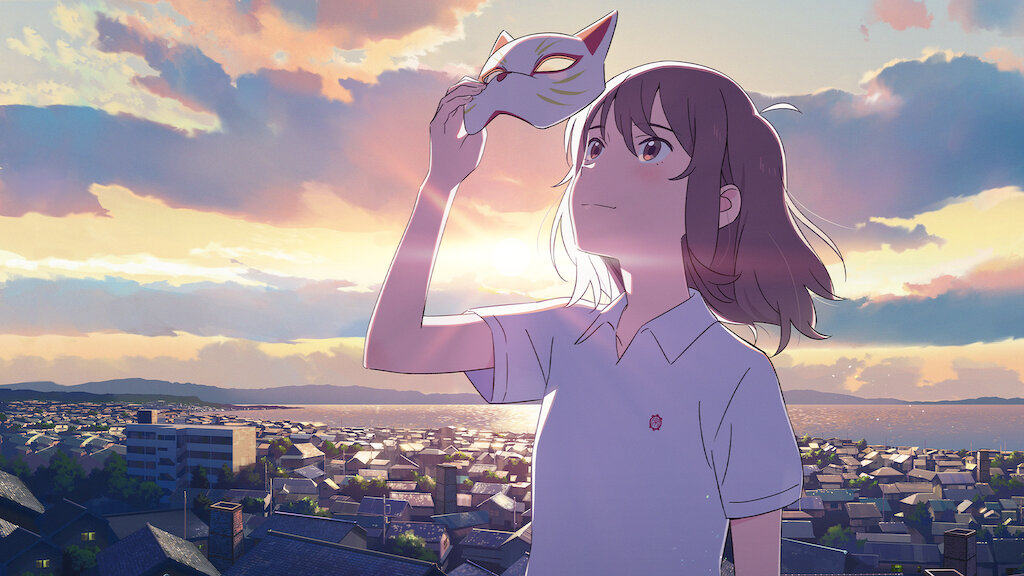Sleeping all day, prowling all night – the life of a cat seems a pretty sweet gig, right? No responsibilities, no commitments and all the glasses you can knock off the table. For Miyo Saski, being a cat means more, though: it’s the only way she can feel loved. Or at least, loved by someone specific. A schoolgirl, Miyo is smitten with classmate Hinode, and her over-zealous attempts to woo have failed. One night, a mysterious Mask Seller offers Miyo a Noh mask, with whiskers and pointed ears. By day, Miyo is a young girl who ‘masks’ her emotions and pain, by night she takes the form of Taro – a white cat, and goes on adventures.
Captivating as it is peculiar, there’s a mesmeric drive behind committing to Mari Okada’s film which will (assuredly) pay-off. Living up to western stereotypes of the genre, A Whisker Away plays into the hegemonic ideas of what anime ‘subscribes’ itself as – exaggerated, perplexing, and occasionally awkward to a western mindset. Yet, it has a droll charm, with a fascinating wit behind the storytelling and fantastical characterisations set against whimsical animation.
Undoubtedly paying homage to the ‘Cat Returns’ series from Studio Ghibli, A Whisker Away reinforces itself with European and American fantasy, notably Hans Christian Andersen’s The Little Mermaid, and passing references to L. Frank Baum’s The Wonderful Wizard of Oz. Animation studios Toho, Colorido and Twin Engine design A Whisker Away with a soft palette of primarily pastel shades, solely utilising the intensity of colour for Taro’s eyes. Much of the backdrop fades into a watercolour, with a focus on characters, and occasionally allowing the scenery moment to shine.
Only when we enter the Island of Cats and find ourselves at the mercy of the omniscient Mask Seller does the tone shift to an intense blaze of lights, deep forests, and emeralds. Illustrated in a way to maximise how different this is to the human world, the Island reflects fantastical versions of bars, fountains, and parks, but with enough removal from reality to suggest an uneasy feeling.
A poignant symbol of folklore in Japanese culture, the antagonistic Mask Seller lurks not as a villain, but as a playful spirit akin to the Norse Loki or Shakespeare’s Puck. Sinisterly frolicsome, Kōichi Yamadera’s voice performance and Okada’s writing hint at a deeper, more enigmatic structure than a simple bizarre tale of cats and school children. Offering Miyo the opportunity to shed her human face and live the life of a cat, the Mask Seller allows the audience to reflect reality through the eyes of a troubled adolescent, whose home life and experiences belay a hidden truth she refrains from confronting.
Gradually, the narrative lets these truths unravel in a deceptively authentic manner, as revelations and troubles are suggested, hinted and then reinforced or discussed after a breaking point, rather than spouted as exposition. Mirai Shida captures boundless energy as Miyo, but when called upon switches her into a distressingly subdued shell of sentiment. Even her characterisation of Taro alters enough of the pace and pitch to compliment the feline aesthetics.
If you could buy into The Little Mermaid trading her soul for legs, then you can get behind a young girl trading her legs for a tail. A Whisker Away is as bemusing, absurd and enchanting as one would expect. Yet, it shocks in how surprisingly astute its portrayal of childhood emotions is, from undervaluing a parent’s struggles at keeping a steady home and grappling with divorce to the dangers of concealing emotions. Tapping into an intense, if bewildering imagination, A Whisker Away spins out a contemporary fairytale, with firm roots in Japanese lore and feline escapades.
A Whisker Away is available to stream on Netflix now
